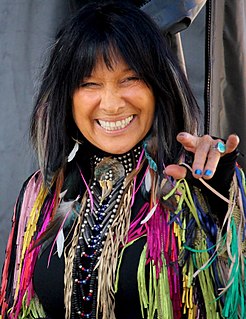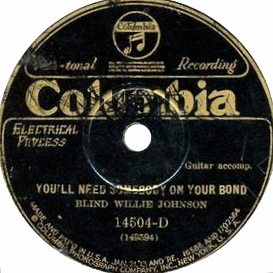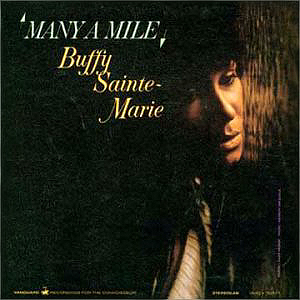
Janis Lyn Joplin was an American singer-songwriter who sang rock, soul and blues music. One of the most successful and widely known rock stars of her era, she was known for her powerful mezzo-soprano vocals and "electric" stage presence.

Willie Mae Thornton, better known as Big Mama Thornton, was an American rhythm-and-blues singer and songwriter. She was the first to record Leiber and Stoller's "Hound Dog", in 1952, which became her biggest hit, staying seven weeks at number one on the Billboard R&B chart in 1953 and selling almost two million copies. Thornton's other recordings included the original version of "Ball and Chain", which she wrote.

Buffy Sainte-Marie, is an Indigenous Canadian-American singer-songwriter, musician, Oscar-winning composer, visual artist, educator, pacifist, and social activist. Throughout her career in all of these areas, her work has focused on issues facing Indigenous peoples of the Americas. Her singing and writing repertoire also includes subjects of love, war, religion, and mysticism. She has won recognition, awards and honours for her music as well as her work in education and social activism.

Big Brother and the Holding Company is an American rock band that formed in San Francisco in 1965 as part of the same psychedelic music scene that produced the Grateful Dead, Quicksilver Messenger Service, and Jefferson Airplane. They are best known as the band that featured Janis Joplin as their lead singer. Their 1968 album Cheap Thrills is considered one of the masterpieces of the psychedelic sound of San Francisco; it reached number one on the Billboard charts, and was ranked number 338 in Rolling Stone's the 500 greatest albums of all time. The album is also included in the book 1001 Albums You Must Hear Before You Die.

Pearl is the second and final solo studio album by Janis Joplin, released posthumously in January 1971. It was the final album with her direct participation, and the only Joplin album recorded with the Full Tilt Boogie Band, her final touring unit. It peaked at number one on the Billboard 200, holding that spot for nine weeks. It has been certified quadruple platinum by the RIAA.

Fairytale is the second album from British singer-songwriter Donovan. It was first released in the UK on 22 October 1965 through Pye Records. The US version of Fairytale was released by Hickory Records in November 1965 with a slightly different set of songs. Peter Eden and Geoff Stephens produced the album.

Live in Japan – Spring Tour 1973 is the twelfth album from British singer-songwriter Donovan. It was only released in Japan in 1973. The album has never been released in either the United States or the United Kingdom.

"Mercedes Benz" is an a cappella song written by singer Janis Joplin with the poets Michael McClure and Bob Neuwirth, and originally recorded by Joplin. In the song, the singer asks the Lord to prove His love for her by buying her a Mercedes-Benz automobile, a color TV, and a "night on the town." There is also a reference to Dialing for Dollars, a franchised format local television program, which required one to be watching the show to win when the show called your phone number, hence the singer's need for a TV.
"Universal Soldier" is a song written and recorded by Canadian singer-songwriter Buffy Sainte-Marie. The song was originally released on Sainte-Marie's debut album It's My Way! in 1964. "Universal Soldier" was not an immediate popular hit at the time of its release, but it did garner attention within the contemporary folk music community. It became a hit a year later when Donovan covered it, as did Glen Campbell. Sainte-Marie said of the song: "I wrote 'Universal Soldier' in the basement of The Purple Onion coffee house in Toronto in the early sixties. It's about individual responsibility for war and how the old feudal thinking kills us all."

"You'll Need Somebody on Your Bond" is a gospel song that is attributed to both tradition and to gospel blues musician Blind Willie Johnson. Johnson first recorded the song in December 1930, although Delta blues musician Charley Patton recorded a similar "You're Gonna Need Somebody When You Die" in October 1929. Over the years, several other musicians have recorded renditions of the song.

"Piece of My Heart" is a romantic funk/soul love song written by Jerry Ragovoy and Bert Berns, originally recorded by Erma Franklin in 1967.

I Got Dem Ol' Kozmic Blues Again Mama! is a 1969 studio album by American singer-songwriter Janis Joplin. It was the first solo studio album Joplin recorded after leaving her former band, Big Brother and the Holding Company, and the only one released in her lifetime.

It’s My Way! is the first album by folk singer Buffy Sainte-Marie, released in April 1964 by Vanguard Records. It was released in Britain in the spring of 1965 by Fontana Records. Though the album did not chart it proved influential in the folk community. It is most famous for two widely covered folk standards, "Universal Soldier" and "Cod'ine", as well as "Now That the Buffalo's Gone", a lament about the continued confiscation of Indian lands, as evidenced by the building of the Kinzua Dam in about 1964. The cover features a mouthbow, which was to be a trademark of her sound on her first three albums.

Hide Your Heart, is the seventh studio album by Welsh singer Bonnie Tyler. It was released in Europe on 9 May 1988 by CBS, and in the US on 20 September 1988 by Columbia Records. The album was recorded in Woodstock, New York, and produced by Desmond Child.

Janis is a compilation album by Janis Joplin, released in 1993. The album features a broad overview of her career from her very first recording in December 1962, to the last songs she recorded during the sessions for Pearl just a few days before her death in October 1970.
"I Know You Rider" is a traditional blues song that has been adapted by numerous artists. Modern versions can be traced back to Blind Lemon Jefferson's "Deceitful Brownskin Blues", which was released as a single in 1927. It later appears in the 1934 book, American Ballads and Folk Songs, by the noted father-and-son pair of musicologists and folklorists, John Lomax and Alan Lomax. The book notes that "An eighteen-year old black girl, in prison for murder, sang the song and the first stanza of these blues." The Lomaxes then added a number of verses from other sources and named it "Woman Blue". The music and melody are similar to Lucille Bogan's "B.D. Woman Blues", although the lyrics are completely different.

Many a Mile is Buffy Sainte-Marie's second album, released in 1965.

Little Wheel Spin and Spin is the third album by Buffy Sainte-Marie, released in 1966. It was her only album to reach the Billboard 200. Its most famous song is "My Country 'Tis of Thy People You're Dying," which displayed a native perspective on the colonisation of North America.
Sweet America was the twelfth studio album by Buffy Sainte-Marie and her last before retiring from music to work on Sesame Street and in education. The album was dedicated to the American Indian Movement and featured some songs with tribal rhythms and vocals that she was later to develop on her 1992 comeback Coincidence and Likely Stories.
"Cod'ine" is a folk song by singer-songwriter Buffy Sainte-Marie. Considered one of the earliest anti-drug songs, she wrote the piece after becoming addicted to codeine, which Sainte-Marie had been given for a health problem. She recorded it for her debut album, It's My Way! (1964).
















